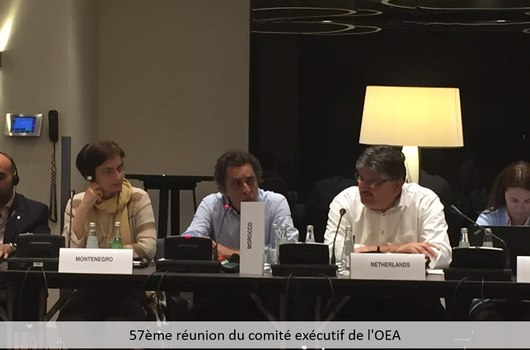The EAO takes stock of the role and approaches of education media in Europe
On June 8th in Warsaw, under their new Presidency (Poland) for a year, members of the European Audiovisual Observatory (EAO), including Morocco which was represented by Mr Jamal Eddine Naji, General Director of the High Authority for Audiovisual Communication (HACA) , at an Expert Seminar, took stock of approaches and action projects in terms of media education or education in medias. During the inaugural session that was introduced by Mrs Halina Rostek and Mr Witold Kotodziejski, from the Polish Audiovisual Council and Mrs Susanne Nikoltchev, Executive Director of the EAO, an update has been provided on “The cartography of Media Education in Europe: practices and actions”, on the basis of a study presented by Mrs Maja Cappello, Head of the Legal Department of the observatory. Regarding her colleague from the EAO, Mr. Gilles Fontaine has emphasized on the question: “How has access to content, especially videos, changed in the digital era?"
Subsequently, Ms Ewa Murawska, from the Polish Audiovisual Regulatory council outlined the vision on the question of this council who celebrates his 20th anniversary, while the EAO celebrates his 25th year of existence under the authority of the Council of Europe and with financial support from the European Commission.
The main aim of this seminar was to exchange national experiences in terms of approaches and action projects. For this end, the few 40 experts and members of the EAO learned three experiments run either by educational or broadcasting institutions, or by regulators. That is how three experiences were chosen by the organizers: The Finnish, The Hungarian and The Moroccan.
In his presentation that focused on Haca’s vision and action approach on this theme, Mr. Naji first stated that this "citizen project, this challenge to citizenship" is considered as a strategic worksite in the strategy of the Moroccan regulator (2013/2017). To the extent that, on one hand, it is led by the President of the institution herself, and on the other hand, it has been, for nearly two years, at the center of concrete relations of partnership with the Unesco, through its regional office in North Africa within the framework of the major program of the UN agency « Media Information Literacy » (MIL).
Recalling as references on which relies the haca’s project action in this area, "democratic choice" constitutionalized in 2011, incorporation of media education into texts framing the audiovisual and the Haca, obligations of the terms of reference, particularly for the public audiovisual sector ...). Mr. Naji defined three pillars of the Haca’s approach: protection, promotion and participation. With objectives to achieve: to know or to be aware, to understand and to act. This, in the direction of, in partnership and in synergy with all the relevant actors: school, audiovisual public sector, private media, content’s professionals, regulators and other mediators and ethics committees...
As an illustration of significant initiatives that reinforce the Haca’s approach, which promotes and encourages any possible synergy in the field, Mr Naji briefly presented the program, which is singular in the region and on the continent, that deploys for months “Arrabita Al Mohammadia Of Oulemas” consisting of a “digital strategy” that offers to several age categories (children, teenagers and youth), through different platforms, a content that deconstructs misleading and extremist speeches broadcast in the mediasphere in terms of religion and all what touches the national identity and memory (www.arrabita.ma; www.arrabitacademy.ma; www.chabab.ma; www.alfetra.ma).
This Moroccan experience, as well as the Finnish one, which began virtually in the late fifties of the last century among school and university system, had particularly elicited number of reactions and debates comparatively to a large number of experiences in Europe, where strategies are struggling to impact target populations: children, youth, educators, parents, media professionals and large public of technology and digital tools’ users.
Furthermore, the day after the seminar, on June 9th, EAO’s members held the 57th meeting of their Executive Committee, whose agenda included the validation of the budget 2017, the adoption of the action plan of 2018 and the reappointment of the Executive Director. The deliberations covered also a number of events that the EAO plans to organize as celebrations of his 25th anniversary, by June 2018, when the presidency of the Executive Committee will pass from Poland to France.







